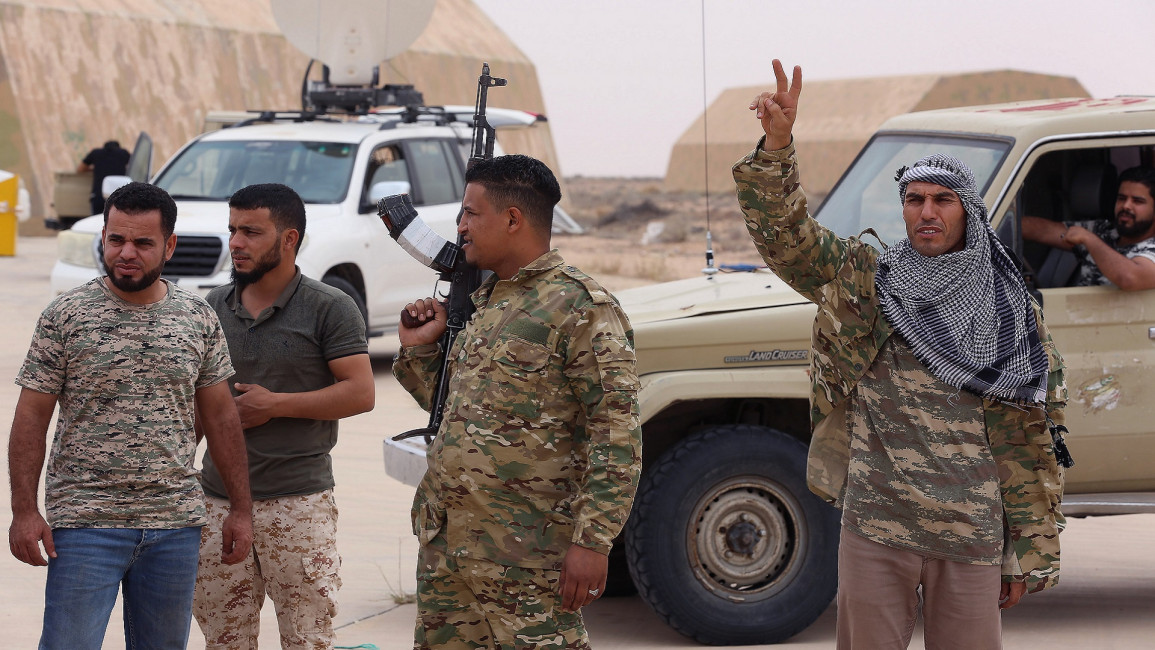Libya's UN-recognised govt claims full control of Tripoli, suburbs
Libya's UN-recognised government said Thursday it was back in full control of Tripoli and its suburbs, capping a string of victories against eastern strongman Khalifa Haftar and vowing to take the whole country.
"Our heroic forces have full control of Greater Tripoli right up to the city limits," Mohamad Gnounou, spokesman for the forces of the Government of National Accord (GNA), said in a Facebook post.
The announcement came after GNA forces retook the Tripoli International Airport on Wednesday, after fierce battles more than a year after losing it as Haftar launched an offensive to seize the capital.
The country's main civilian airport, in Tripoli's southern outskirts, had been disused since 2014 when it was heavily damaged in fighting between rival militias.
But it was a key strategic prize on a major highway into the capital.
The unity government's deputy defence minister Salah Namrush said Thursday that GNA forces "are continuing their advance, chasing the terrorist militias from the walls of Tripoli."
"Some of their commanders are fleeing towards Bani Walid airport," some 170 kilometres (110 miles) southeast of the capital, he added on Facebook.
Haftar, whose main base is in the east, seized most of southern Libya early last year before launching his offensive on the capital in April, vowing to "cleanse" it from "terrorist militias" backing the GNA.
A rapid early advance stalled on the edges of Tripoli in fighting that has killed hundreds and forced around 200,000 people to flee.
But GNA forces with heavy Turkish backing have made a string of gains from Haftar's forces in recent months.
Footage of GNA troops manning positions held until recently by Haftar's fighters was widely circulated on Libyan television channels and social media.
Foreign support 'decisive'
GNA head Fayez al-Sarraj, speaking after meeting Turkish President Recep Tayyip Erdogan in Ankara on Thursday, insisted that his government would impose its control over the whole of Libya.
|
||
"Our fight continues and we are determined to defeat the enemy, impose state control on the whole of the homeland and destroy all those who jeopardise the construction of a civil, democratic and modern state," Sarraj said.
Wolfram Lacher, a Libya analyst at the German Institute for International and Security Affairs, said Haftar's setbacks "show how decisive foreign support has become for both sides".
GNA forces have been boosted by Turkish drones and air defences in recent months, enabling them to retake important coastal towns and a key airbase Haftar had been using to bomb GNA positions.
Haftar is supported by neighbouring Egypt and the United Arab Emirates as well as Russia.
UN experts in April said hundreds of mercenaries from the murky Russian paramilitary organisation the Wagner Group were fighting for him.
But last month, as Haftar's losses mounted, the GNA said Wagner Group fighters had withdrawn from combat zones south of the capital.
With the loss of Tripoli, "Haftar could face increasing challenges to his authority over eastern and southern Libya," Lacher wrote in a blog post.
"Rivalries within the anti-Haftar alliance will also return to the fore."
Mohamad al-Gammoudi, a GNA commander on the Tripoli front, told AFP that government forces had taken back a string of districts across the south of the capital, along with an airbase used by Haftar's forces.
He said GNA forces were now encircling Tarhuna, which served as a major launchpad for Haftar's operation, and that "its fall and return to the legitimate government's control is just a question of time".
But Lacher warned that a GNA effort to take Tarhuna could spark a protracted conflict.
Libya has endured years of violence since the 2011 uprising that toppled and killed longtime dictator Moamer Kadhafi, with two rival administrations and scores of militias battling for power.
The United Nations has urged outside powers to respect a deal reached at a January conference in Berlin, ending foreign meddling and upholding a much-violated arms embargo.
While a truce brokered by Turkey and Russia has been repeatedly violated, the UN said talks on a ceasefire resumed Wednesday, welcoming it as a "positive" first step.
Russia warned Thursday of "catastrophic consequences" if the fighting continues.
"We are convinced that the ongoing military actions will only lead to the aggravation of the systemic crisis" in Libya, said Russian foreign ministry spokeswoman Maria Zakharova.
Follow us on Facebook, Twitter and Instagram to stay connected



